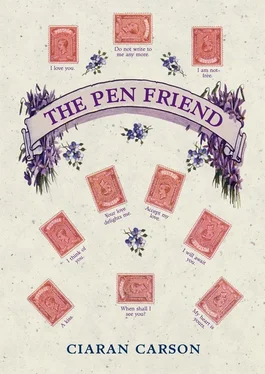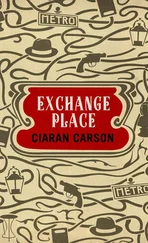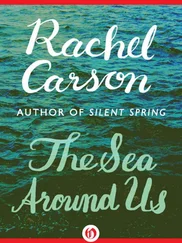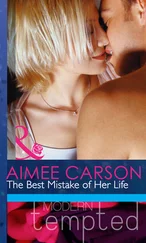So what did you do? I said. Oh, first of all I got myself a phone, you said. Or rather, I spent four weeks getting a phone. They weren’t too stuck on phones. Face to face is what we want, they said. You’re a Field Officer, after all. So I went into the field. I met people. Got myself invited to exhibition openings, that kind of thing. Privately I call myself a style consultant, you said.
So there you were in New York, Nina, in your role as style consultant, and we were at this reception with the Irish mafia when the news came in that four Ulster Defence Regiment soldiers had been killed in Tyrone by an IRA landmine. It was the 13th of July 1983. You remember. We’d drunk a lot of champagne. You were wearing a pale green linen suit and a jade pendant, I remember, with green amber earrings. We talked about the Troubles and we drank some more champagne and it was then that I told you that my mother had been killed in 1975 as she was driving to her school on the Antrim Road. She had stopped at traffic lights when a white laundry van drew up beside her and the bomb it was carrying, intended for God knows what target, exploded prematurely.
You were silent for a while, and then you said, I know what it’s like to lose a mother for no good reason. My mother took her own life in 1965. She was forty-eight. I was fifteen. I won’t go into the reasons now as to why I think she did it. But for months afterwards I used to dream that she wrote to me. Letters from beyond the grave. They came in pale blue envelopes addressed to Miranda. I would open the envelope excitedly, thinking she must be still alive, but then the letter would say something like, I am happy where I am now, and I am still watching over you, that kind of thing, you said. And I remember again, Nina, how I burned your letters in 1984, hoping that by so doing I would expunge all memory of you from my system, and as I watched their ashes snow upwards into the grey July sky I wanted you to be dead for me, I wanted that part of me that loved you to be dead.
But there was something else in the dream that made me feel that she was indeed watching over me from somewhere, you said, for the letters bore something else beyond the clichéd words, something more immediate and tangible, her perfume. The perfume that she wore the morning she kissed me for the last time, as she went her way and I mine. In the dream I’d bury my face in the pages of her letter and I would wake with my eyes full of tears. And every year on her anniversary I open a bottle of that perfume. You were silent again. What was it? I said. What was what? you said. Her perfume, I said. Après l’Ondée , you said, After the Rain-shower. A warm musky base, almond top-note. Then you get the scent of hawthorn and violets doused in rain, cold and shivery.
I wonder what you wonder, when you wonder how your postcards might affect me. After your last card I was tempted to buy a flacon of Après l’Ondée , to experience your mother’s perfume, but that would have been trespass, and I am content to make do with your remembered words, for I think you must intend me to find a narrative in your semi-disconnected messages, and so arrive at an understanding of our time together that has long been hidden deep in my memory. And your fifth card made me remember something I had forgotten. For when I read the words, Eine Kleine Nachtmusik , I heard them playing the acoustic perfume of Mozart that night in New York, and I could hear the top-note clarity of newly rinsed hawthorns and violets shimmering over the bass cellos of the musk-roses that crowded the great bay window. And when you told me of your mother’s suicide, I imagined I could smell her perfume, emanating from you as you spoke those words, as if you had enfolded her aura within you, and had taken on her spirit as it left her.
The classical ensemble had been hired by you, as style consultant for the evening. You had stipulated that there was to be no Irish music. We want to throw them off balance a little, you said, skew the received ideas a little. It’ll be warm, but we won’t have the air-conditioning all the way up as they come in, we want it just a little sultry, and then when it starts to feel a little stuffy, we’ll turn it up, and introduce a little apple-blossom scent into the air, it’ll be like an Irish spring evening. We want muted Irish, no Paddywhackery. I’ll have a little pale shamrock motif in the table-linen, more apple-green than shamrock, you said. You chose the flowers, the silverware, the menu. It was to be a stand-up buffet affair, you wanted good circulation, when people have to juggle drink and food and talk they’re put off their dignity a little, you said, and if a little champagne is spilled so much the better. Helps them unwind.
I’d been sceptical of your plans. These are not only hard-nosed businessmen, I said, but sentimental bigots, they don’t want their preconceptions upset. Yes, you said, so we won’t give them any. But we’ll give them something else, an aesthetic experience. No one is immune to beauty. You had the whole place lit with candles, candelabras with real candles that formed cataracts of wax as the evening progressed, and the scent of candle-wax and apple-blossom wafted through the pools of light and shade in the room and flickered on the silverware and linen with an almost ecclesiastical aura, and it occurred to me that some of these hard-nosed businessmen would have been altar-boys once and that you had taken that into consideration. Yes, you said, I want to remind them of the numinous, the things that are important beyond all this fiddle. Let them think they are cardinals, you said, not gombeen men, as I watched them form little dark-suited groups and eddies of conspiracy, well-fed faces nodding and smiling in the shadows and oases of light thrown by the candles amid the cut-glass vases full of white gardenias.
And, thinking of your mother’s otherworldly perfume, I was reminded of the nineteeth-century mediums who specialised in olfactory effects. The Rev. Moses Stainton, for one, who in the course of his séances would produce liquid scents, sometimes of familiar perfumes, such as jasmine, heliotrope, verbena, sandalwood, new-mown hay, sometimes of perfumes unrecognised. Sometimes it appeared sprayed from the air, sometimes poured as if from a vial into the cupped palms of the sitters; often it would be found oozing from the medium’s head and running down into his beard. Stainton was also capable of introducing objects into the room, seemingly from mid-air — pearls, rubies, sapphires, and emeralds, as well as more common objects such as books, opera-glasses, gloves, pin-cushions, shells, thimbles, snuff-boxes, kitchen knives, and candlesticks. The celebrated medium Mrs Guppy once asked each of the nineteen people present at a séance to wish for a fruit. First a banana appeared, then two oranges, a bunch of white grapes, a bunch of black grapes, a cluster of filberts, three walnuts, thirteen damsons, a slice of candied apple peel, three figs, two apples, an onion, a peach, five almonds, four very large grapes, three dried dates, a potato, two Conference pears, a pomegranate, two crystallised greengages, a pile of dried currants, a lemon, and a bunch of raisins, all in the order in which they had been wished for.
There were various theories to account for these phenomena: some thought them to be ectoplasmic emanations, or that they had been transported from another corner of the universe, or from another plane, or that they had been produced from Platonic forms. Whatever the case, the raps and levitating tables of the Goligher Circle paled beside these baroque manifestations. Yet the Goligher phenomena were perhaps all the more mysterious for their banal austerity. After examining them closely for some six years, W.J. Crawford claimed to have found no evidence of imposture. However, on 30th July 1920 he committed suicide, and the suspicion that his action had something to do with a discovery about the Golighers is unavoidable. A few days before his death he wrote to a friend:
Читать дальше












